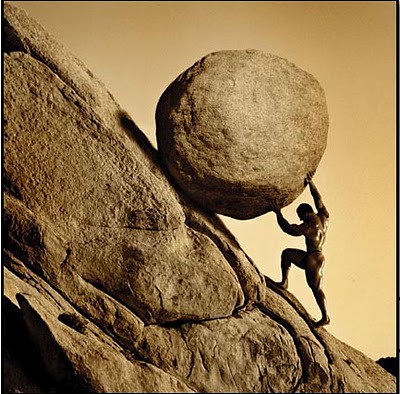By Sarah Easter, Kim Ceulemans & Monty Lynn

Globally, scores of people are pursuing sustainability initiatives. With issues as complex and intractable as climate change, social inequality, and poverty, gains often are hard won and setbacks occur regularly. Continuing to strive for change in stiff winds of resistance becomes a challenge in itself.
Nevertheless, some change agents persist. We wondered why and how. Like Sisyphus, who was made to endlessly roll a boulder up a steep hill without ever reaching the top, what allows some people to cope and persist in contexts where change seems insurmountable? Answers to this question could help others endure in change-resistant settings.
For a research setting, we chose a university where the adoption of sustainability initiatives has been sluggish, and advocates have sought to advance a variety of initiatives for over a decade with limited forward momentum. We interviewed 24 individuals, observed 190 hours of sustainability-focused meetings, and analyzed approximately two hundred archival documents, coding and distilling behaviors and perspectives that matured into persistence.
When pressed to maintain the status-quo by a lack of resources, apathy, and a dearth of support from others, resilient actors relied upon three primary coping tools:
- Community building: connections with other faculty, staff, and/or students that yield support for sustainability-focused initiatives on campus;
- Resourcefulness: limited material resources utilized in creative ways, such as a faculty advisor for a student organization focused on environmental sustainability reaching out to other faculty on campus for monetary support;
- Vision: envisioning future possibilities rather than focusing on present realities, such as a faculty member talking about changes she would like to see on campus in terms of resource management.
Additionally, individuals persisted in pursuing sustainability-focused change when they felt hopeful and encouraged. This combination of the three primary coping tools and a hopeful emotional response strengthened resilience and enabled persistence.
Given that resilient actors were circumventing hopelessness, we ultimately titled the paper “Moving Beyond Sisyphus” rather than “Contending with Sisyphus” with the encouragement of the reviewer team.
Identifying coping and emotional tools empowers individuals to labor for sustainable and healthy futures and provides a foundation for researchers exploring resilience in organizational settings.
References
Dyke, J. (2014). Understanding transitions may be critical to our survival. The Conversation, 22 July 2014. Retrieved from: https://theconversation.com/understanding-transitions-may-be-critical-to-our-survival-28378.
Easter, S., Ceulemans, K., & Lynn, M.L. 2022. Moving beyond Sisyphus: Pursuing sustainable development in a business-as-usual world. Business & Society, 61(4): 924-963.
